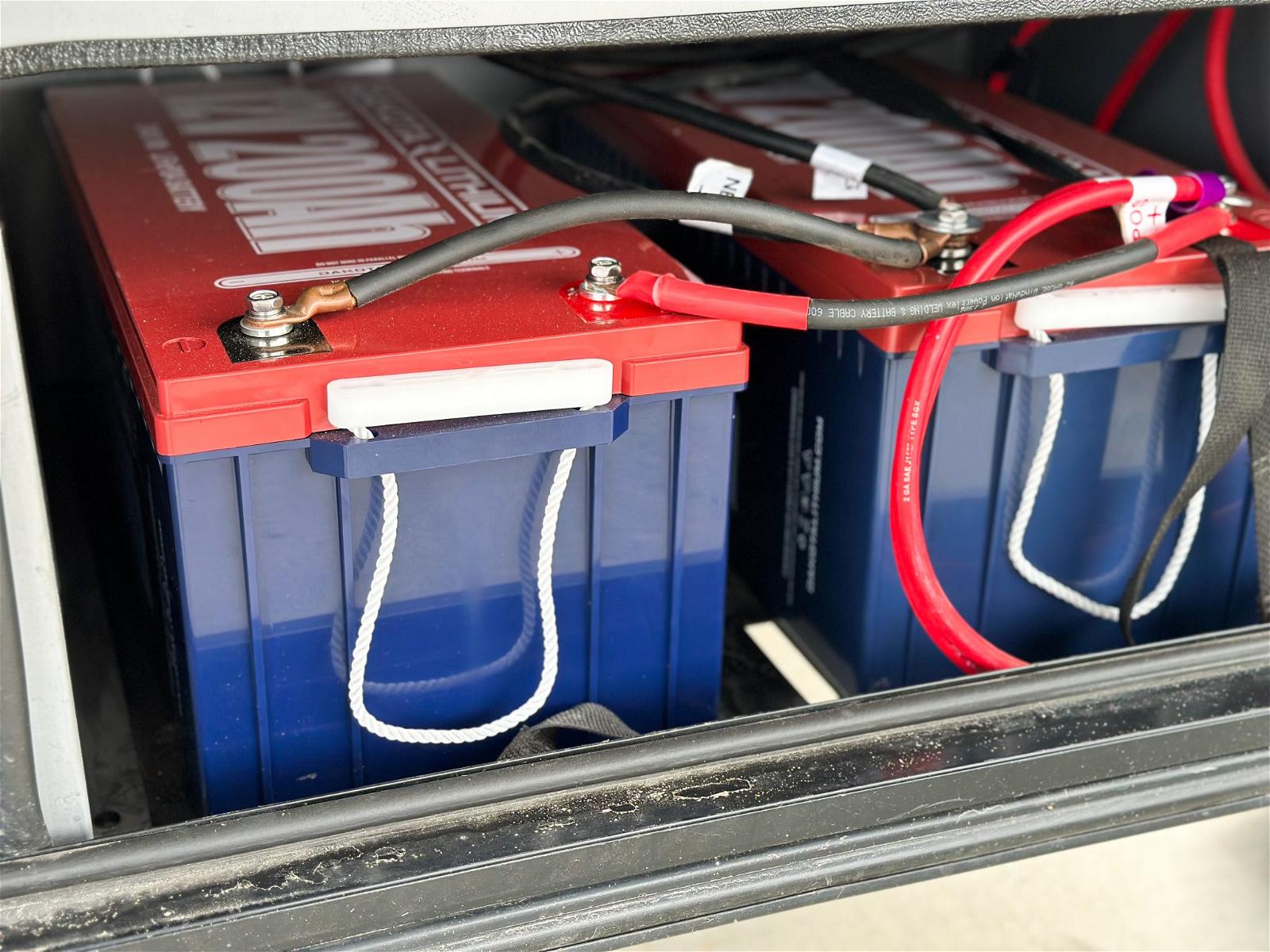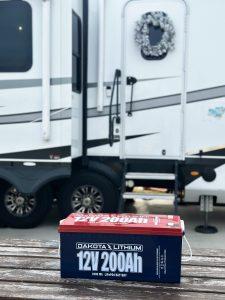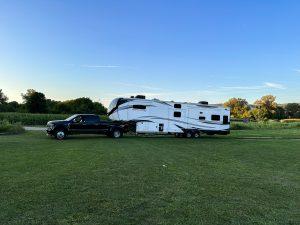Complete Guide for purchasing batteries for your RV
November 29, 2023 | Gwendolyn Call
Complete Guide for purchasing batteries for your RV
After you purchase your RV one of the next purchases that should be top of mind is, which battery will you buy for your tiny home on wheels. Your battery may not seem important right away but as you delve into RVing you will see that having the right battery that will last, that you can rely on and that supports your RVing needs will be crucial. An RV battery can be just as important as any other purchase you make when it comes to RVing.
RV batteries vary greatly, and the different types differ in cost, reliability, construction, maintenance and most importantly what they can do for your RV and you. Before you buy batteries for your new RV or upgrade your old ones, doing your research to understand exactly what you need is key.

2 – Dakota Lithium 12V 200Ah in our Jayco 5th Wheel
What Is a Deep Cycle Battery vs. a Regular Battery
The battery decision for new RV owners can be very overwhelming and confusing, with dozens of choices. Understanding the main types of batteries will help clear up some of that confusion. RV power systems will have a deep cycle battery (some refer to them as “house” batteries), whereas drivable motorhomes will have an additional standard automobile battery (also known as “starter” batteries), like what you find in all cars and trucks on the road. Deep cycle batteries are designed to provide a consistent delivery of power.
The standard automobile battery will provide a more powerful burst of electricity to start an engine, but only over a short duration and then the alternator takes over and can recharge the battery. Unlike your regular battery you will need to provide a way to recharge deep cycle batteries in your RV, this can easily be done when you are connected to shore power or by generating your own power with a solar power system.

Dakota Lithium 12V 200Ah’s RV Batteries Powers our Jayco 5th Wheel
What are the different RV Batteries
RV battery types vary tremendously and even though you now know you need a deep cycle battery your options still vary quite a bit. Looking online or in a store can immediately feel overwhelming, just like most products these days the options are endless. However, there is one battery that stands out from the rest so let’s look at the various RV batteries and note the distinct differences, the most common styles and what sets them apart from one another. Having the right knowledge gives you the power to select the right batteries.
Flooded Lead-Acid Batteries Falling under the category of what I would describe as the most basic battery and what is most used. You will find this battery comes at a relatively low price and long history in the RV industry. As we have talked about in previous blogs, space is so important in RV life, this requirement can make them very difficult to use in a tiny space.
Absorbent Glass Mat (AGM) Batteries You will find that AGM batteries rely on very similar principles to flooded lead-acid batteries however, venting these batteries are not needed as they are completely sealed. AGM batteries also typically operate better in extreme temperatures. These few benefits will come with a price as you will pay for more per a battery.
Gel Cell Batteries Gel cell batteries may be something you have not heard of, they offer a variation to the lead-acid battery, with a gel replacing the typical electrolyte solution between the plates. Like the above AGM battery, the fact that this is sealed removes the need for extra ventilation. You will find that the cost is a bit high compared to flooded lead-acid varieties.
All of the fore-mentioned batteries have their weaknesses, from cost to maintenance and even as mentioned, the ability to store them anywhere, which may not seem like a big deal but when space is limited it is in fact a huge factor. However, as a fulltime RVer nothing is more important to me than reliability of my RV batteries. This leads me to the next battery option and by far the best option for all the reasons that matter most when you consider “what” it is doing for you as an RVer.
Lithium-Ion (LiFePO4) Batteries
Lithium batteries have forever changed the way we can live and function in our RV. This technology that has forever changed the battery industry and over the last decade. Dakota Lithium offers a variety of LiFePO4 batteries, with a wide range of Amp-Hour (Ah) ratings for any type of RV. The best part about these batteries is they last longer, are more reliable, no maintenance, and there is no need to have a special ventilated location to store them.

Chaos, Kiddos & Harmony Jayco RV
What RV Battery Should you choose and which Type Is Right for You
Now that we have covered the various batteries the hard work starts. This next step of determining which type is right for you can feel like a huge task. One of the most important aspects to look at before we dive into some more of the details is, what are your batteries being used for? This is the by far most important question, as it will help you to decide what you need. For example, if boondocking and staying off grid is important making sure you have the right size and number of batteries will be crucial. If you will be connected to shore power, or only needing your batteries for when you are driving, a smaller battery bank will work for you.
Let’s look at a guide to help you make your next decisions.
Cost
Let’s start with what is typically on everyone’s mind, “what is this going to cost?” As we discussed above generally flooded lead-acid batteries will be the cheapest out there, and if you are on a budget, you may be swayed in this direction. This is one of those purchases though that you get what you pay for. Lithium batteries tend to be at the top of the price range in upfront costs. However, this is most certainly an item that you get what you pay for- with the higher costs comes superior batteries. You will see a much longer lifespan; in fact, they may be the only batteries you ever need for your RV.
Amp-Hour Rating
This is one of the most important items to consider and can often feel like the most complicated. Amps, when talking about electric current, is an important unit if measurement. All deep cycle batteries will come with a rating to gives you measurement of overall capacity. More specific, an Amp hour (Ah) is the rating used to tell consumers how much amperage a battery can provide for a one-hour time period. This will be vital to determine and, as we covered above, based on your needs and use of the batteries this will greatly sway your amp-hour requirements.
Watt-Hours
Watts is a measure of electric usage. Every electric item (appliances, lights, and devices) should have the wattage listed on it. There are numerous online calculators to help you determine your power usage needs, with a simple Google search, you will have all the information you need to make a clear decision.
Lifespan
This goes back to our cost discussion, the lifespan of your battery is important for so many reasons but one that is crucial is, if you are using your batteries to boondock and stay off grid, having a long lifespan is key. The overall lifespan of each battery type, how long they will last, and when you may need to replace them is really a huge factor. Lithium batteries can last to 10 years or more, making them the longest-lasting RV battery types. Lead Acid batteries will have an average lifespan maximum of 4-6 years. Chances are the LiFePO4 batteries will long outlast your RV, not to mention the resale value of solid power system anchored by superior batteries.
Depth of Charge
Speaking from personal experience this could not be a more crucial thing to consider. Unfortunately, before installing our Dakota Lithium batteries, we had this happen often, just when you thought you had enough juice to brew that cup of coffee you would find out you don’t. Depth of charge will help you to avoid running out unexpectedly or potentially seriously damaging your batteries. Lead Acid batteries only use approximately half of their capacity, with a depth of charge of about 50%.
While your battery may show that it has a stated capacity, you’ll only be able to discharge a certain portion of it before it stops providing power. This is because of depth of charge. Overcharging or undercharging can greatly reduce the longevity of the Lead-acid batteries. By way of comparison, Lithium batteries use nearly 99% their potential capacity, and charging cycles do not decrease battery performance. This makes lithium batteries the far superior technology but more over it makes these batteries safer and reduces a risk of damaging a battery and adding more cost to you.
What you need to remember
Buying batteries is one part of the process, but knowing how many and what kind is the bigger part of this purchase, make sure you refer back to this blog when battery shopping. Think of a few key elements to making this purchase, what are your needs, what will your power consumption look like and what is your budget. If you can narrow your focus down to these few items, it will greatly help uncomplicate this often-complicated purchase. Dakota lithium has done an excellent job providing batteries for every need big or small.
Happy Adventuring,
Gwendolyn from Chaos Kiddos & Harmony